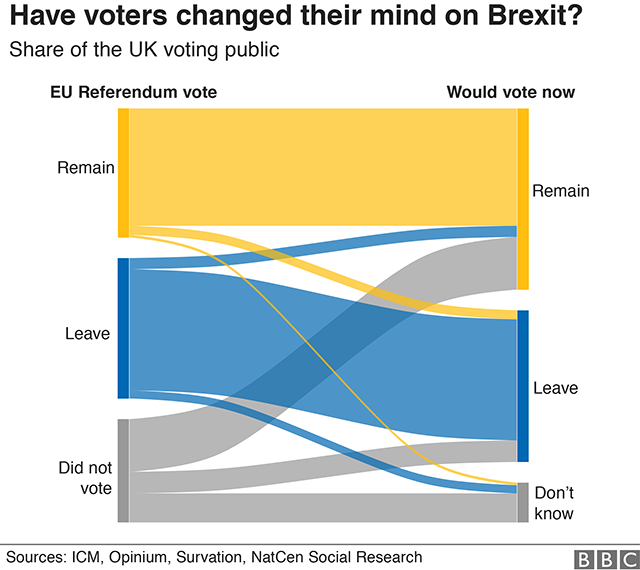This item (HERE) by professor John Curtice on the BBC website points to a "small swing in favour of remain". Our leading psephologist says he thinks this owes more to people who did not vote before saying they would now vote to remain. This is true. Those who did vote and are now moving from leave to remain are partially cancelled by remainers changing their mind.
But it does seem to indicate a definite trend. Importantly, there is not the slightest indication that voters are becoming more enthused by Brexit. But there is plenty of evidence they are becoming disillusioned by it. The article includes this chart:

And I note the following:
- More people changed from leave to remain than moved the other way.
- Far more previous don't knows moved to remain than to leave.
- Far more previous leave voters moved to don't know than previous remain voters
So, to me the trend is clear
Leave voters are moving to don't know (i.e. becoming less sure about Brexit) and don't knows break more for remain (becoming more convinced that Brexit is wrong)
This is exactly what you would expect as people begin to understand what Brexit actually means.
The article says:
The four most recent readings - taken by BMG Research and Survation between November and January - have, on average, once the 8% who said "don't know" are left to one side, put Remain on 52% and Leave on 48%. In contrast, four such polls undertaken towards the end of 2016 still put Leave narrowly ahead, by 51% to 49%.
Similarly, four recent polls - conducted by ICM and ComRes between December and March - that looked at how people might vote in a second referendum, albeit without posing the exact question that was on the ballot paper, have also on average put Remain slightly ahead - by 51% to 49%.
More regular readings of how voters now view Brexit have been provided by a question that YouGov have put to their respondents since shortly after the referendum.
This reads, "In hindsight, do you think Britain was right or wrong to vote to leave the EU?" There is a clear, if hardly dramatic trend.